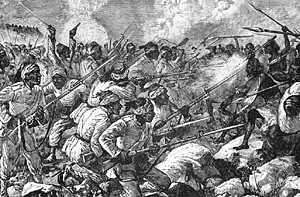On 20 January 1977, former Regiment Sergeant-Major Jones Richard' Miles died at the age of 97 years old. He was known to be the last British survivor of the Sudan; Campaign, having fought at Omduran., with the 2nd Batt. Rifle Brigade. His was asked by an officer of his old regiment for his recollections of the battle. With the deference and brevity of a soldier of his generation addressing an officer, the old gentleman replied, "If you'll pardon the expression, bloody hot!"
--(Extract from 'A Good Dusting.'
Introduction
0n the 5th November 1883, an Egyptian force of some 10,000 men led by a British officer Lt. General William Hicks Pasha, was slaughtered to a man by the Mahdi's Ansar. This was followed by another disastrous expedition the following year, again commanded by a British officer - Baker. This time for the loss of 1,800 men. Egypt had lost control of the Sudan.
These successes and many other minor ones, not only gave the Mahdi 'The Expected One' huge stores of- supplies and weapons, but gave him more importantly, power. He predicted such victories and they certainly happened. These caused thousands to flock to his banner, with many tribes pledging their allegiance from all over the Sudan.
 Osman Dignas Fuzzies defeating Baker's Egyptians
Osman Dignas Fuzzies defeating Baker's Egyptians
Egypt's rule over the Sudan, had been one of suppression at its worst. Heavy taxes, no justice, a totally corrupt administration and army, which due to its very erratic payment, would extract its existence from the Sudanese population. Slavery still flourished when most other countries had ceased the practice and many Sudanese benefited from the trade, not to mention the corrupt Egyptian officials.
Great Britain held great sway over Egypt, due to its huge financial investment in the country, because of the Suez Canal. Britain had already recently fought a campaign in Egypt against Arabi Bay, an Egyptian officer who had led a large army revolt against the Khedive of Egypt. So Britain had strong reasons for watching over the country.
This influence was used by Britain and other European powers to put pressure on Egypt to finally abolish slavery in the Sudan. Not wishing to alienate these countries, the Khedive started to recruit European military officers to help in this task, notably our own Charles Gordon (don't miss issue 7). With burdening oppression and now the few benefiting from life under Egyptian rule ie. slave traders, now having their livelihood taken away, the fire was just awaiting a spark.
This spark was to come in the form of the son of a boat-builder - Mohammed Ahemd Ibn El Sayyid Abulah the Mahdi EL MUNTAZER (expected one) a prophet whose coming was foretold.
Since 1881, Egypt had been trying to capture, or if possible kill the Mahdi, who was camped on an island named Aba on the white Nile, some 150 miles south of Khartoum. Some successes were scored against his growing followers, but the majority were less so, with huge amounts of weapons falling to the Mahdi. With the revolt in Egypt still fresh in the armies mind and the growing number of defeats in the Sudan, the Egyptians soldiers morale was at rock bottom. The Khedive pleaded for British support, which was not to be forthcoming as yet. Britain indicated that no British troops would be sent, but that foreign officers or retired, or even half pay British officers could be used to command Egyptian forces. This brings us back to the beginning of this chapter. Great Britain, seeing the vital Sea port of Suakim threatened, was extremely and all too reluctantly drawn into the conflict. The holy war had indeed begun (Jihad).
Back to Colonial Conquest Issue 4 Table of Contents
Back to Colonial Conquest List of Issues
Back to MagWeb Master List of Magazines
© Copyright 1993 by Partizan Press.
This article appears in MagWeb (Magazine Web) on the Internet World Wide Web.
Other military history articles and gaming articles are available at http://www.magweb.com